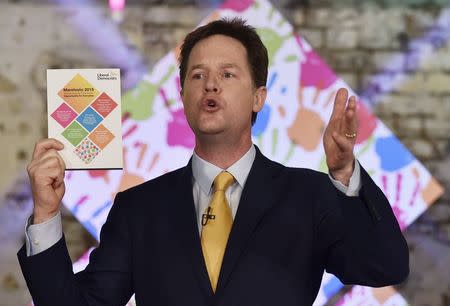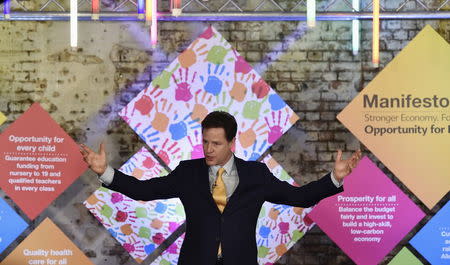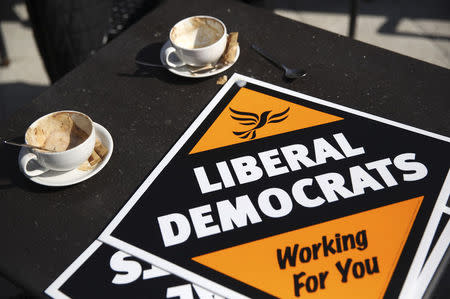Liberal Democrats hint Cameron's EU referendum plan negotiable
By William James LONDON (Reuters) - Britain's Liberal Democrats, possible kingmakers after a close election in three weeks' time, hinted they could back some form of Prime Minister David Cameron's plan to hold an EU membership referendum in return for unspecified concessions. Unveiling their policy manifesto on Wednesday, the centre-left party, the junior partner in a coalition with Cameron's Conservatives since 2010, set out five priority areas they signalled were non-negotiable in future coalition talks. Cameron's plan to hold an EU referendum by 2017 was not among them, however, and though the Liberal Democrats made clear they didn't think the Conservative leader's Europe strategy was a wise one, they hinted they might be able to sign up to an amended version of it. "We don't want an EU referendum on an arbitrary Tory (Conservative) Party timetable, we can't make that clearer and think it is a serious risk to economic stability," David Laws, the senior Liberal Democrat lawmaker behind the manifesto, told reporters. "But it would be premature and presumptuous to start negotiating these things before the first vote has even been cast." Nick Clegg, the Liberal Democrat leader, said his party's position - that a referendum should only be held when there is a change in the EU treaties - had not changed. But when pressed, he declined to describe it as a deal-breaker in possible coalition talks in future. Instead, his party's manifesto described pledges on fair taxes, economic discipline, healthcare, the environment and education as the areas where it wouldn't compromise. Neither centre-left Labour nor Cameron's centre-right Conservatives are on track to win an outright majority on May 7, in what is forecast to be one of the country's closest elections since the 1970s. The Liberal Democrats go into the vote hoping they can overcome a collapse in support and hang on to enough seats to influence which major party forms the next government. Clegg urged voters to back his party rather than the separatist Scottish National Party (SNP) or the anti-EU UK Independence Party (UKIP), both of whom also say they hope to end up holding the balance of power. "There is a very thin line between Britain being governed by a coalition with a conscience or a coalition with a grievance," said Clegg. Wednesday's manifesto, which presented the party as a moderating force, was framed to allow the party to take on a coalition role with either Labour or the Conservatives. (Editing by Andrew Osborn)

 Yahoo News
Yahoo News 




